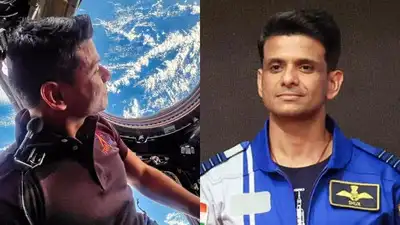Shubhanshu Shukla, India’s First Astronaut to Visit the International Space Station (ISS), recently shared fascinating insights about life in space through instagram videos and social media posts. One of the biggest challenges he highlighted is eating and drinking in microgravity, where food and liquids float free and can easily create a message. Shukla humorously explained, “You can eat water in space,” but emphasized that astronauts must be very careful. Using Special Packaging and Velcro to Secure Everything, Astronauts Must Adopt Slow and Deliberate Movements, A Practice Shukla Calls The Mantra “Slow Is Fast,” Safly Manage Fast, to Safely Manage Food and Drink in Zero Gravity.
Shubhashu shukla explains the challenge of eating in space
Eating in space is far more complicated than it appears. Without gravity, food and liquids do not stay in containers or on utensils and can float around, potentially creating hygiene issues or even Damaging sensitive equipmant. Astronauts relay on Specially designed packaging, velcro straps, and magnetic traps to keep meals secure. Shukla Emphassies the Importance of Slow, Controlled Movements to Prevent Spills, Avoid Floating Food Particles, and Ensure That Every Bite Reaches the Mouth Safely. Even simple tasks like drinking water require careful Technique, Such as using seled pouches with straws, making “Eating water” a careful, deliberate process rather than a casual activity.
Contrary to Popular Belief, The Human Body does not need gravity to digest food. Shukla explained that peristalsis, a process involving rhythmic muscle contractions, movies food through the digestive system from the Mouth to the stomach and Intestines. This gravity-independent mechanism ensures that astronauts can digest meals meals effectively, even when upside down or floating freely in microgravity. Other digestive processes, including the breakdown of nutrients by enzymes and absorption in the small intestine, containue to function normally, allowing astronauts to get the Energy and Nutrints Needed to sustain Long-Duration Space Missions.
Adapting survival habits for Life aboard the ISS
Shukla’s observations show that Astronauts must release basic survival behavival behavioors in microgravity, from eating cared carefully to managing floating Liquids and utensils. These adaptations are essential for safety, hygiene, and overall well-marriage. Beyond Physical Adjustments, Astronauts Alaso Develop Mental Strategies, Such as Patience and Mindfulness, to Manage these unusual tasks effectively. Shukla’s Insights Make Complex Space Science Excessible Zero-Gravity Environment. His engaging posts have sparked conversions among students and space enthusiasts after the country. They highlight how science communication can bridge the gap between astronauts’ live experiences and public imagination.



